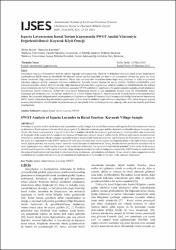Isparta lavantasının kırsal turizm kapsamında SWOT analizi yöntemiyle değerlendirilmesi: Kuyucak Köyü örneği

View/
Access
info:eu-repo/semantics/openAccessAttribution-NonCommercial-NoDerivs 3.0 United Stateshttp://creativecommons.org/licenses/by-nc-nd/3.0/us/Date
2018Metadata
Show full item recordAbstract
Günümüzde ihtiyaç ve beklentilerin hızlı bir şekilde değiştiği turizm pazarında, ülkelerin ve bölgelerin alternatif olarak turizm faaliyetlerini çeşitlendirmesi büyük önem arz etmektedir. Bu alternatif turizm çeşitleri içerisinde yer alan ve son zamanlarda oldukça ilgi gören ise, kırsal turizm olmaktadır. Diğer taraftan kırsal turizmin, ülkeler için toplumun tüm bireylerine katma değer artışı yaratması ve refah seviyelerinde yükselme sağlayıcı özelliği nedeniyle kalkınma hedeflerinde, üzerinde önemle durulan bir turizm türüdür. Özellikle sürdürülebilir yerel kalkınma açısından oldukça etkili bir özelliğe sahip olan kırsal turizmde farklı uygulamalar sektörde kendine yer bulabilmektedir. Bu noktada kırsal potansiyeli olan her bir bölgenin kırsal turizm açısından SWOT analizlerinin yapılması ve bu analiz sonuçları ışığında gelişim planlarının hazırlanması önemli olmaktadır. Türkiye’de kırsal turizm bakımından Isparta ili son zamanlarda adından sıkça söz ettirmektedir. Adıyla özdeşleşen gül üretiminin yanı sıra lavanta üretiminde de zirvede bulunan Isparta ili, önemli sayılacak düzeyde kırsal turizm potansiyeline sahiptir. Bu çalışmada; bölgenin kırsal turizm potansiyeli bağlamında Isparta ili Kuyucak Köyü lavanta yetiştiriciliği kırsal turizm kapsamında SWOT analizi yöntemiyle değerlendirilerek güçlü zayıf yönleri, fırsat ve tehditleri tespit edilmeye çalışılmıştır. Elde edilen bulgular ışığında lavanta yetiştiriciliğinin verimli üretim ve pazarlanması yanı sıra yörede kırsal turizmin gelişimine yapacağı katkı açısından öneriler getirilmesi amaçlanmıştır. Nowadays in tourism market which needs and expectations rapidly change, it is crucial that countries and regions diversify tourism activities as an alternative. Rural tourism is the one which plays a part of the alternative tourism types and has attracted considerable interest in recent years. On the other hand, rural tourism is a type of tourism that is emphasized on the development goals because of creating added value increase for all the people of the society for the countries and because of feature providing of rising at welfare levels. Different applications in rural tourism, which have a particularly effective feature especially in terms of sustainable local development, can find place for themselves in the sector. At this point, it is important to make SWOT analyzes of rural areas for rural areas and to prepare development plans in the light of these analysis results. Isparta province has recently make a name for oneself in terms of rural tourism in Turkey. Besides the rose production identified with its name, Isparta province, which also has a peak in the production of lavender, has a potential rural tourism potential. In this study; in the context of rural tourism potential of the region, Kuyucak village in Isparta province lavender farming was evaluated by SWOT analysis method within the scope of rural tourism and was tried to determine strong weaknesses, opportunities and threats. It was aimed to make suggestions on the contribution of lavender cultivation to the development of rural tourism in the locality in the light of the obtained information.
Source
International Journal of Social and Economic SciencesVolume
8Issue
2Collections
The following license files are associated with this item:


















